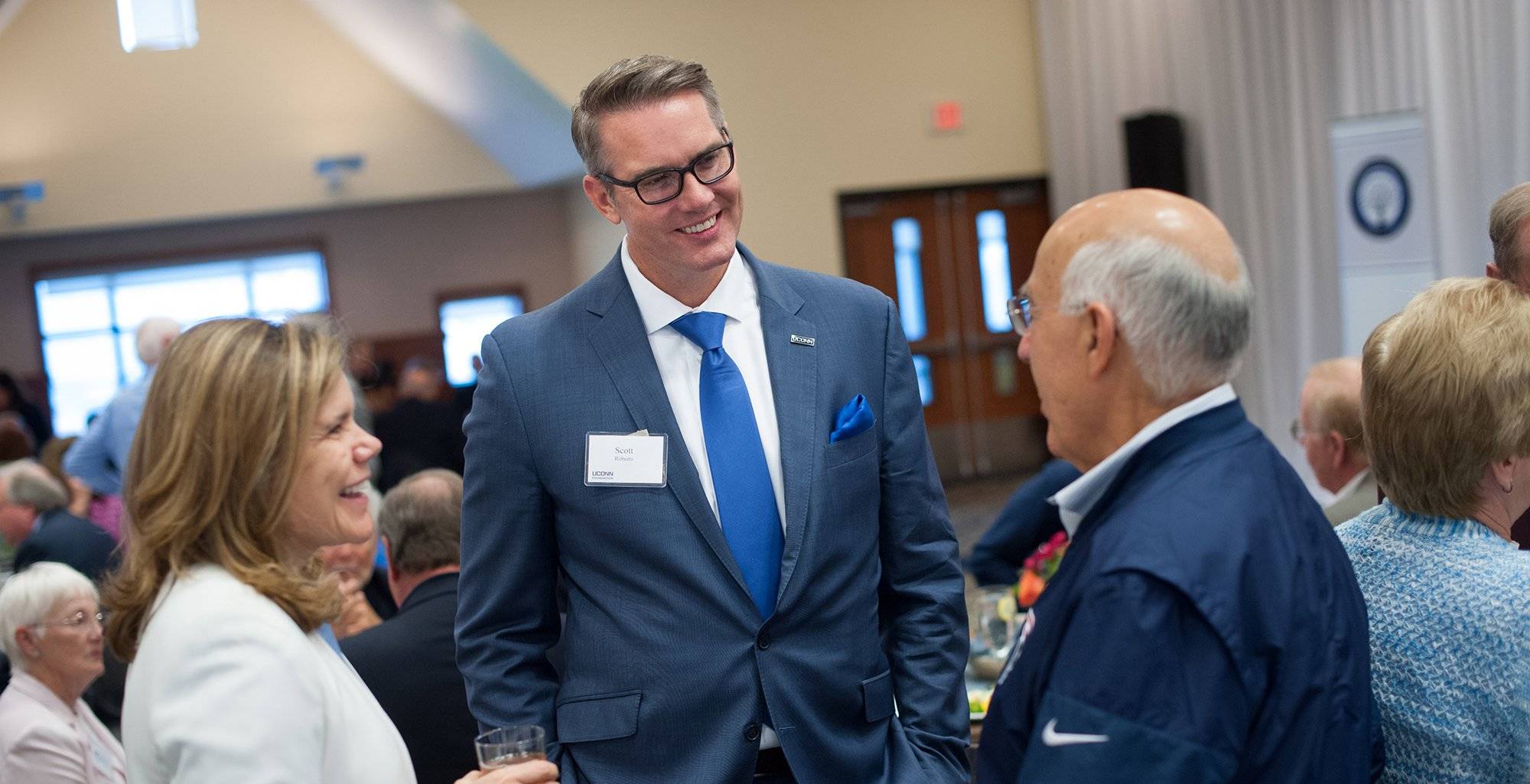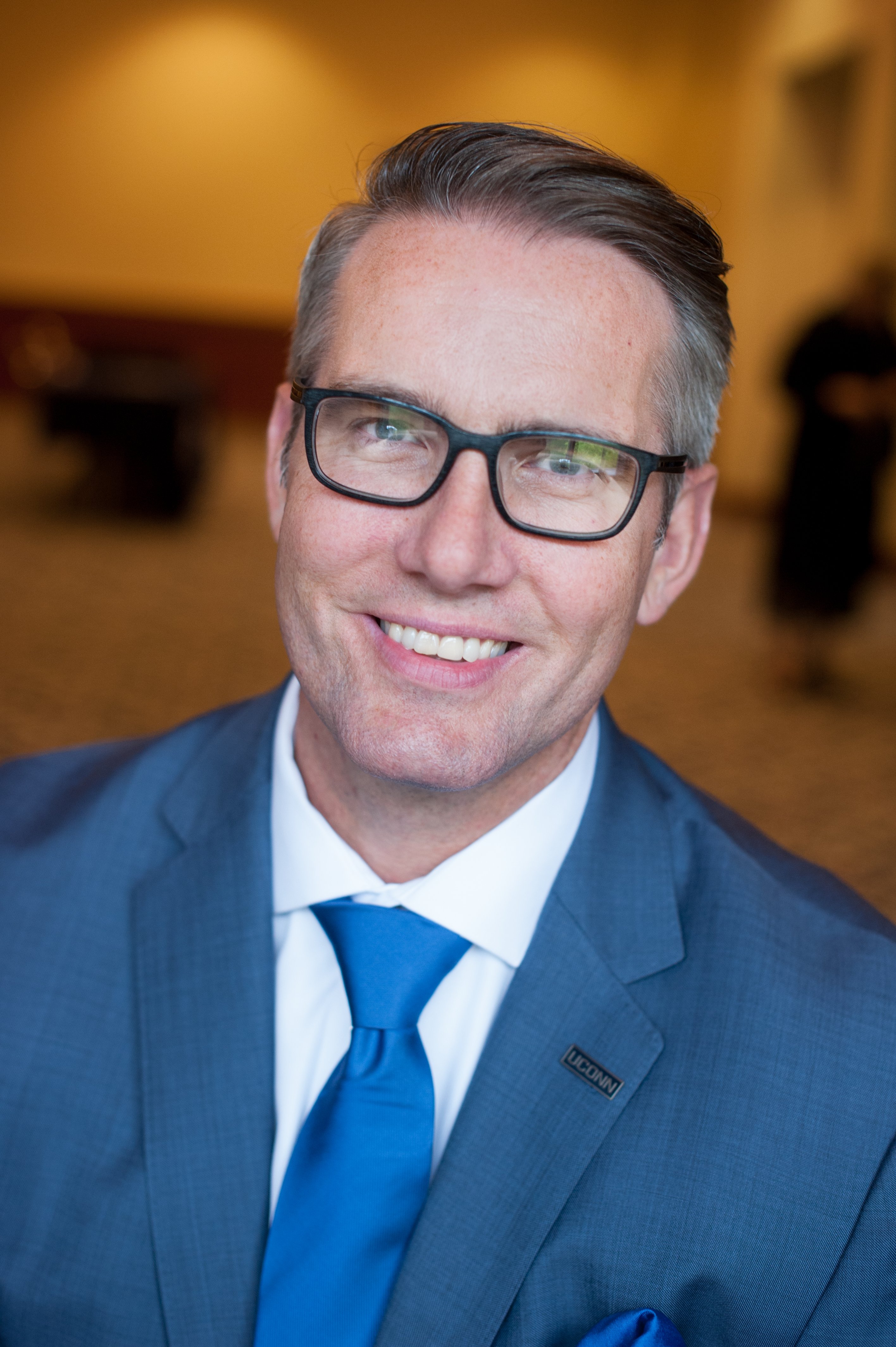Q & A with Scott Roberts

From Las Vegas to Storrs, the UConn Foundation’s new president has a passion for changing young people’s lives.
The first thing you notice about Scott Roberts, the UConn Foundation’s new president and CEO, is how tall he is. At 6-foot-7, he jokes that ceiling fans are not his friend. And it’s not too hard to imagine him playing professional basketball, which he did in Sweden and Germany for two years after college.
 But then you notice how upbeat he is and how passionate he is about helping young people. Colleagues describe him as easy going, whip smart, and incredibly thoughtful—key qualities for a professional fundraiser.
But then you notice how upbeat he is and how passionate he is about helping young people. Colleagues describe him as easy going, whip smart, and incredibly thoughtful—key qualities for a professional fundraiser.
He first entered the world of fundraising as a district executive for the Boy Scouts of America. He loved the job and seeing how he could positively impact others. Two years later, a volunteer urged him to apply for a job as director of major gifts at Pittsburg State University in Kansas, and he found his real passion.
“That’s when I found my true calling, my passion for education fundraising and the impact you can have to change lives,” he said. “I was helping 3,000 kids at the Boy Scouts, and now I was at a university helping 7,000 kids.”
From there, he became vice president for philanthropy and alumni engagement at the University of Nevada-Las Vegas (UNLV), which he led to an all-time annual fundraising record of $93 million in fiscal year 2017.
Roberts grew up in the small town of Carthage, Mo., where his mother and stepfather ran a garden shop and nursery. He holds an associate’s degree from Missouri State University–West Plains, a bachelor’s from the College of the Ozarks, and a master’s in public administration from UNLV.
His wife, Barb, is director of undergraduate recruitment at UNLV. Barb and Scott have two daughters, Marley, 13, and Audrey, 11.
We talked with Roberts recently about his impressions of UConn and his goals for the Foundation.
You grew up in Missouri. What was that like?
I would say it’s a lot like Connecticut. I grew up kind of near the Ozarks in Missouri and driving around here, from even Manchester to Storrs, it looks exactly the same: lots of big trees, lots of green, all four seasons—and the winters are not fun there either. I think you’d be surprised how similar it is.
Tell me about the College of the Ozarks. Its nickname is ‘Hard Work U,” right?
The beauty of College of the Ozarks is that it is one of two or three colleges in the nation where students graduate debt-free. You don’t pay any tuition. In exchange for that, you must work on campus your entire time there. You’re essentially working 20 hours a week during the school year to pay for tuition. Then you work 40 hours a week in the summer and during holidays. The college is mostly student-run. The students do the landscaping and run the facility plant and the cafeteria. You have employees who are managing, but it’s really students who are doing the work. It’s a unique way of running a college campus.
How did you meet your wife?
She’s gonna kill me for telling this story. We met in college. I was there playing basketball. We actually grew up fairly close, but went to different high schools, so we never met one another. My father got the local newspaper, and one day it had a press release in it that said she had signed a letter of intent to play volleyball at the same college where I was—Missouri State. My dad cut out this article, wrote on it ‘you should meet her,’ and mailed it to me. We just had our 19th wedding anniversary this June.
Did you receive a college scholarship yourself?
My wife and I were both beneficiaries of scholarships at Missouri State. My wife is a first-generation college student, and my mother never went to college. I value how I can help provide a step for students who don’t know or don’t get that encouragement at home. My wife and I both think that it has changed our lives, having the opportunity to get an education. I want to be able to help provide that for others. I think that’s why people get into this line of work. They understand the power of education, and this is our way of trying to provide opportunities.
You have a lot of experience in alumni relations and fundraising, first at Pittsburg State University and most recently at UNLV. What was your biggest accomplishment?
I take a lot of pride in trying to build a team that works well together and finding the resources they need to be successful. In guiding the ship at UNLV, one of the things I felt proud about is that for two years in a row, the Council for Advancement and Support of Education (CASE) recognized the UNLV team for overall improvement and overall performance. We got both those categories two years in a row. That’s a testament to the team and the work they did.
What’s the biggest hurdle currently facing the UConn Foundation?
From a fundraising or alumni perspective, I think the biggest hurdle is identifying a way to have the long-term growth that we need to elevate our engagement and fundraising activities. Budgets are always tight, but we have to figure out a way to continue to grow – and do it in a healthy way. I’ll work with the leadership team, the board chair, and the University president to think through that. There are certainly some significant growth opportunities. We just have to figure out a way to make it all fiscally feasible.
UConn is a large university with many schools and colleges. Many alums seem to identify with those more than UConn as a whole. How do you build loyalty and get alums to donate at a school like UConn?
I think it’s all relative based on the type of institution. When you look at private institutions, they’ve been doing this a lot longer than any public university. When they opened their doors, they knew they were going to have to fundraise to survive. Even though UConn is 140 years old, I would argue that the fundraising efforts didn’t really kick into high gear until somewhat recently, the last 10 years perhaps. We’re still fairly young in our maturation of fundraising, and I think the potential is certainly there.
But I would also argue that we’re not in a bad place. I mean we have 22,000 donors a year. That’s still a lot of donors. There’s certainly room to grow, but there’s a lot of folks that really are passionate about this place.
What is your long-term goal for the UConn Foundation?
The easy answer is we have to elevate our fundraising and engagement activities and production. That’s the ultimate goal of any foundation: to do more and constantly strive to be better and more strategic.
In the short term, I think it’s critical that we don’t lose momentum. My predecessor here, Josh Newton, did a great job of setting things up the right way and getting it structured for success. It’s going to be critical to not miss a beat, but to just continue to build off that momentum. I also think we have an incredible opportunity with the new University president, Tom Katsouleas, and me coming in at the same time, ready to invigorate new relationships and continue that momentum.
What was your biggest epiphany—a life-defining change that shaped you into the person you are today.
One of things that has made a real impact on my life is forming my own personal board of advisors. That’s kind of an official way of saying that you have an inner circle that you really trust.
You don’t have to ask someone to be on it, you just know who’s on it. It’s a diverse group of friends, colleagues, and mentors. I think those three complement one another and help guide you when you are struggling with situations or decisions, personal or professional. These are the people you can go to, who know that it’s confidential, and who you can trust. They can give you another perspective on things going on in your life or career.
What is your life philosophy? How did you develop that philosophy?
My life philosophy is to always remain positive, enthusiastic, and compassionate. Those are the three things that I always try to live by. I have a really hard time ever seeing a glass half empty. My eyes just don’t work that way. I choose to always see things as opportunities and believe that things are a lot better than what they could be. It’s just the way I’ve always been.